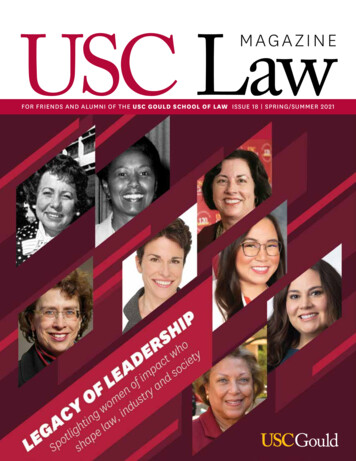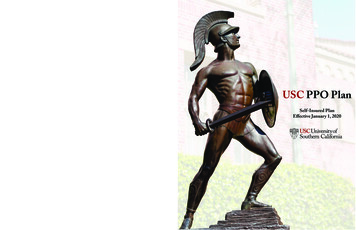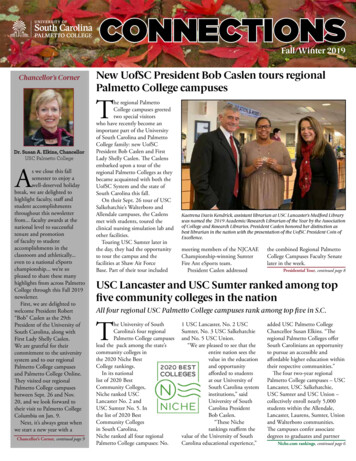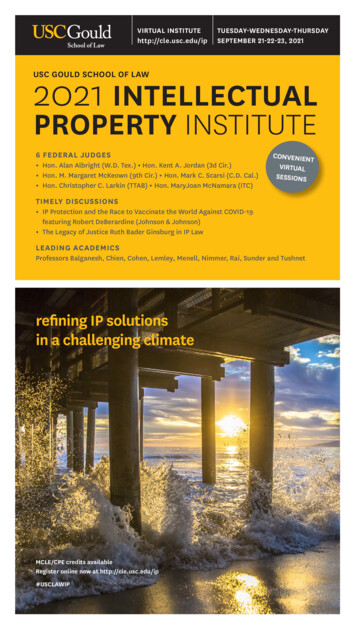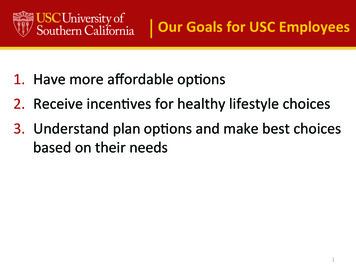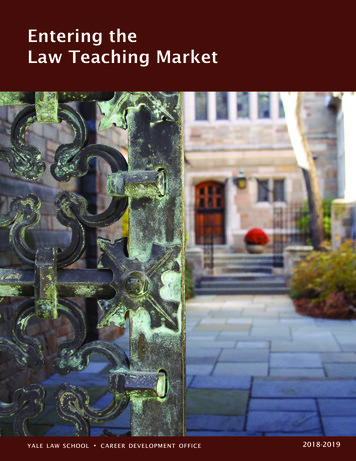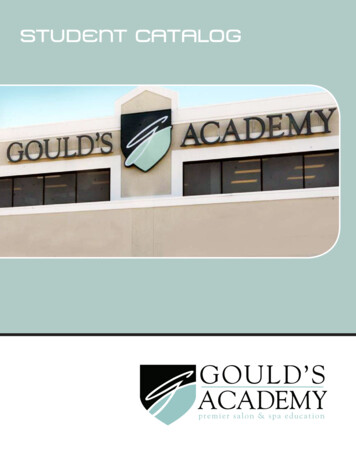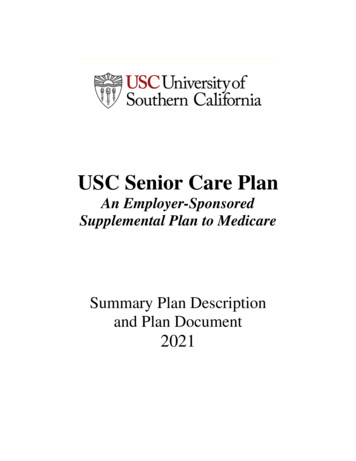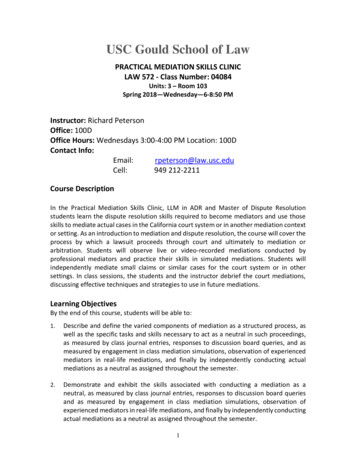
Transcription
USC Gould School of LawPRACTICAL MEDIATION SKILLS CLINICLAW 572 - Class Number: 04084Units: 3 – Room 103Spring 2018—Wednesday—6-8:50 PMInstructor: Richard PetersonOffice: 100DOffice Hours: Wednesdays 3:00-4:00 PM Location: 100DContact Info:Email:rpeterson@law.usc.eduCell:949 212-2211Course DescriptionIn the Practical Mediation Skills Clinic, LLM in ADR and Master of Dispute Resolutionstudents learn the dispute resolution skills required to become mediators and use thoseskills to mediate actual cases in the California court system or in another mediation contextor setting. As an introduction to mediation and dispute resolution, the course will cover theprocess by which a lawsuit proceeds through court and ultimately to mediation orarbitration. Students will observe live or video-recorded mediations conducted byprofessional mediators and practice their skills in simulated mediations. Students willindependently mediate small claims or similar cases for the court system or in othersettings. In class sessions, the students and the instructor debrief the court mediations,discussing effective techniques and strategies to use in future mediations.Learning ObjectivesBy the end of this course, students will be able to:1.Describe and define the varied components of mediation as a structured process, aswell as the specific tasks and skills necessary to act as a neutral in such proceedings,as measured by class journal entries, responses to discussion board queries, and asmeasured by engagement in class mediation simulations, observation of experiencedmediators in real-life mediations, and finally by independently conducting actualmediations as a neutral as assigned throughout the semester.2.Demonstrate and exhibit the skills associated with conducting a mediation as aneutral, as measured by class journal entries, responses to discussion board queriesand as measured by engagement in class mediation simulations, observation ofexperienced mediators in real-life mediations, and finally by independently conductingactual mediations as a neutral as assigned throughout the semester.1
Co-Requisite (s): NoneConcurrent Enrollment: NonePrerequisite(s): NoneRequired Readings and Supplementary Materials The Practice of Mediation: A Video-Integrated Text, Douglas N. Frenkel, James H.Stark. 2nd Edition (Aspen Coursebook Series)Paperback: 560 pagesPublisher: Aspen Publishers (June 13, 2012)ISBN-10: 1454802197; ISBN-13: 978-1454802198eISBN 978-1-4548-2143-4 (electronic format)NOTE: MAKE SURE YOU PURCASE THE 2ND EDITION.The course text is available in several formats. An excellent electronic copy is available fromthe publisher for 135.00. It provides for lifetime access and also has online resources. Alink for obtaining this version of the text is provided n-frenkel-v9781454821434?term eISBN 978-1-4548-2143-4Paperback format of the text is available at ef sr 1 1?ie UTF8&qid 1515460145&sr 81&keywords the practice of mediation frenkel starkAdditional articles and reading materials may be provided by the professor during thesemester.Recommended Supplemental Reading MaterialsThe following books are highly recommended although not required reading for thiscourse:Getting to Yes, Negotiating Agreement Without Giving In, Roger Fisher, William Ury,Bruce Patton, Penguin Books ng-AgreementWithout/dp/0140157352/ref sr 1 3?s books&ie UTF8&qid 1515626717&sr 13&keywords Getting to YesBeyond Reason: Using Emotions as You Negotiate, Roger Fisher and Daniel Shapiro,Harvard Negotiation Project (2006)https://www.amazon.com/s/ref nb sb ss i 2 13?url search-alias%3Dstripbooks&fieldkeywords beyond reason using emotions as you negotiate&sprefix beyond reason%2Cstripbooks%2C192&crid 3LWOLLRAL6PAT2
Difficult Conversations: How to Discuss What Matters Most, Douglas Stone, Bruce Patton,Penguin Books ns-Discuss-WhatMatters/dp/014028852X/ref sr 1 1?s books&ie UTF8&qid 1515626280&sr 11&keywords difficult conversationsDescription and Assessment of AssignmentsDuring the semester students will be required to complete various written andperformance based assignments which will include the following: Weekly class simulations; Periodic discussion board queries; Weekly typed class journal entries; Observation of real life mediations conducted by advanced and trained mediationstudents and /or professional mediators (Up to 8 mediations during the semester) Independent preparation/conduct of real life mediations in small claims court matters,or in other contexts as assigned by your professor. (Up to 3 mediations during thesemester)Grading BreakdownThe Practical Skills Mediation Clinic is a graded course. There is no final exam. Gradingoptions are CR/D/F only.In order to receive “CR” for this course, students must comply with the following courserequirements:Class attendance. Students are required to attend all class meetings. (More than twoabsences during the semester may result in a “D” or “F” grade.) Active and meaningfulcontributions to class discussion, skill proficiency in preparing for and conductingsimulations are essential components for receiving credit for this course.Quality written assignments. Written assignments, including journal entries, should betimely submitted, and demonstrate an understanding of the reading and class discussions.The best journal entries do not focus unduly on the facts of the case or the mechanics ofthe mediation, but instead show an ability to reflect on your performance as a mediator –and where applicable, should discuss and devise strategies for improving your techniques.Failure to timely submit written assignments could result in a “D” or “F” grade.Knowledge and skill in preparing for and conducting court mediations. Credit for thiscomponent of the course is not dependent upon whether you actually achieve settlementat mediation, but will instead focus on your efforts to help the parties reach settlement,with an emphasis on demonstrated creativity, practical problem solving, and application ofthe mediation techniques studied and practiced in class. It is critical to workcollaboratively, professionally, and productively with the parties, judges and courtpersonnel, our partner agencies, and (where applicable) your co-mediator. Failure to3
attend a previously assigned mediation for observation, or failure to complete a previouslyassigned independent mediation could result in a “D” or “F” grade.Assignment Submission PolicyAssignments are due on the date and at the time specified. Late submissions may not beaccepted for credit unless prior arrangements are made with the professor.Additional PoliciesAttendanceAttendance at every class meeting is important. Sign-in sheets are used to recordattendance and are circulated during class. It is the student’s responsibility to assure thatthey have signed the attendance sign-in sheet each week. If a student must be absent forunavoidable reasons the student is expected to contact the instructor in advance. Studentsshould be knowledgeable about, and review requirements for course attendance in theUSC Law School Student Handbook, Section 5.0. According to the “general rule,” which isadopted for this course, Students may miss one class session per course unit-hour withoutan excuse.Class ParticipationStudents are expected to read all materials assigned for each class meeting and areexpected to be prepared to participate in discussions, simulations and presentations whencalled upon.Communication with InstructorStudents are encouraged to contact Professor Peterson with any questions or concernsregarding the course, materials for the course, assignments, etc. via email, text, or cell.Telephone calls and emails will typically be responded to the same day or at the latestwithin 24 hours (weekends excepted).Email: rpeterson@law.usc.eduCell: 949 212-2211Classroom Computer UsageYou may use your laptop computer during class for the purpose of taking notes or othertasks directly related to, and supportive of your participation in class.The use of acomputer in class for activities or purposes unrelated to the course causes a significantdistraction for other students and severely disrupts the ability of those students toparticipate fully in class. Therefore, any improper use of a computer during class (including,but not limited to, composing, sending, or reading emails; instant messaging; searching orbrowsing the Internet; playing games; and/or viewing movies) is prohibited.4
Course Schedule and Assignments: A Weekly BreakdownWeek 1Topics/Daily ActivitiesReadings andHomeworkActivitiesMediation Clinic OverviewNoneSimulationThe Role of the MediatorChapters 1 & 3SimulationPreparing to Mediate;Mediation as a StructuredProcessChapters 4 & 5SimulationOpening the Process,Developing InformationChapter 6SimulationExpanding InformationChapter 7SimulationIdentifying and FramingNegotiating Issues, Organizingan Agenda; GeneratingMovement Through ProblemSolving and PersuasionChapters 8 & 9SimulationConducting the Bargaining,Dealing with Impasse;Concluding the MediationChapters 10 & 11Simulation / ShadowThe Ethics of Mediation;Representing Clients inMediationChapters 12 & 13Shadow1-10-18Week 21-17-18Week 31-24-18Week 41-31-18Week 52-7-18Week 62-14-18Week 72-21-18Week 82-28-185
Pages 481 – 539Chapters 15 & 16Shadow3-7-18The Law of Mediation & EthicalIssues for Advocates andMediatorsWeek 10NoneNoneNoneCase RoundsTBAShadowCase RoundsTBAShadow/MediationCase RoundsTBAMediationCase RoundsTBAMediationCase RoundsTBAMediationCase RoundsTBAReviewWeek 93-14-18SPRINGBREAKWeek 113-21-18Week 123-28-18Week 134-4-18Week 144-11-18Week 154-18-18Week 164-25-186
Statement on Academic Conduct and Support SystemsAcademic Conduct:Plagiarism – presenting someone else’s ideas as your own, either verbatim or recast in yourown words – is a serious academic offense with serious consequences. Please familiarizeyourself with the discussion of plagiarism in SCampus in Part B, Section 11, “BehaviorViolating University Standards” https://policy.usc.edu/scampus-part-b/. Other forms ofacademic dishonesty are equally unacceptable. See additional information in SCampus anduniversity policies on scientific duct.Support Systems:Student Counseling Services (SCS) - (213) 740-7711 – 24/7 on callFree and confidential mental health treatment for students, including short-termpsychotherapy, group counseling, stress fitness workshops, and crisis g/National Suicide Prevention Lifeline - 1-800-273-8255Provides free and confidential emotional support to people in suicidal crisis or emotionaldistress 24 hours a day, 7 days a week. ip & Sexual Violence Prevention Services (RSVP) - (213) 740-4900 - 24/7 on callFree and confidential therapy services, workshops, and training for situations related togender-based harm. https://engemannshc.usc.edu/rsvp/Sexual Assault Resource CenterFor more information about how to get help or help a survivor, rights, reporting options,and additional resources, visit the website: http://sarc.usc.edu/Office of Equity and Diversity (OED)/Title IX compliance – (213) 740-5086Works with faculty, staff, visitors, applicants, and students around issues of protected class.https://equity.usc.edu/Bias Assessment Response and SupportIncidents of bias, hate crimes and microaggressions need to be reported allowing forappropriate investigation and response. onse-support/Student Support & Advocacy – (213) 821-4710Assists students and families in resolving complex issues adversely affecting their successas a student EX: personal, financial, and academic. https://studentaffairs.usc.edu/ssa/7
Diversity at USCTabs for Events, Programs and Training, Task Force (including representatives for eachschool), Chronology, Participate, Resources for Students. https://diversity.usc.edu/Disability StatementThe USC Gould School of Law is committed to providing reasonable accommodations formembers of the student body who have disabilities, to ensure that students are given anequal opportunity for learning and pursuing their academic interests. Such circumstancesmay include, but are not limited to, permanent or temporary physical disabilities, learningdisabilities, and pregnancy.Any student with a documented disability (physical, learning, or psychological) needingacademic accommodations should contact USC Disability Services and Programs office(DSP) /dsp/home index.html andmeet with a DSP Counselor to discuss the student's request for accommodations. Allstudents requesting permanent or temporary accommodations must register with DSPto be eligible for accommodations.See USC Law Student Handbook, Section 7.1.8
Negotiating Issues, Organizing an Agenda; Generating Movement Through Problem-Solving and Persuasion Chapters 8 & 9 Simulation Week 7 2-21-18 Conducting the Bargaining, Dealing with Impasse; Concluding the Mediation Chapters 10 & 11 Simulation / Shadow Week 8 2-28-18 The Ethics of Mediation; Representing Clients in Mediation
